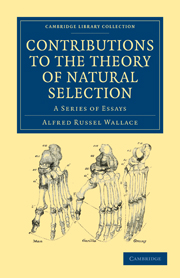Book contents
- Frontmatter
- Preface
- Preface to the Second Edition
- Contents
- I On the Law which has regulated the introduction of New Species
- II On the Tendency of Varieties to depart indefinitely from the Original Type
- III Mimicry, and other Protective Resemblances among Animals
- IV The Malayan Papilionidœ, or Swallow-tailed Butterflies, as illustrative of the Theory of Natural Selection
- V On Instinct in Man and Animals
- VI The Philosophy of Birds' Nests
- VII A Theory of Birds' Nests; showing the relation of certain differences of colour in female birds to their mode of nidification
- VIII Creation by Law
- IX The Development of Human Races under the Law of Natural Selection
- X The Limits of Natural Selection as applied to Man
- NOTES
- INDEX
IV - The Malayan Papilionidœ, or Swallow-tailed Butterflies, as illustrative of the Theory of Natural Selection
Published online by Cambridge University Press: 29 August 2010
- Frontmatter
- Preface
- Preface to the Second Edition
- Contents
- I On the Law which has regulated the introduction of New Species
- II On the Tendency of Varieties to depart indefinitely from the Original Type
- III Mimicry, and other Protective Resemblances among Animals
- IV The Malayan Papilionidœ, or Swallow-tailed Butterflies, as illustrative of the Theory of Natural Selection
- V On Instinct in Man and Animals
- VI The Philosophy of Birds' Nests
- VII A Theory of Birds' Nests; showing the relation of certain differences of colour in female birds to their mode of nidification
- VIII Creation by Law
- IX The Development of Human Races under the Law of Natural Selection
- X The Limits of Natural Selection as applied to Man
- NOTES
- INDEX
Summary
Special Value of the Diurnal Lepidoptera for enquiries of this nature.
When the naturalist studies the habits, the structure, or the affinities of animals, it matters little to which group he especially devotes himself; all alike offer him endless materials for observation and research. But, for the purpose of investigating the phenomena of geographical distribution and of local, sexual, or general variation, the several groups differ greatly in their value and importance. Some have too limited a range, others are not sufficiently varied in specific forms, while, what is of most importance, many groups have not received that amount of attention over the whole region they inhabit, which could furnish materials sufficiently approaching to completeness to enable us to arrive at any accurate conclusions as to the phenomena they present as a whole. It is in those groups which are, and have long been, favourites with collectors, that the student of distribution and variation will find his materials the most satisfactory, from their comparative completeness.
Pre-eminent among such groups are the diurnal Lepidoptera or Butterflies, whose extreme beauty and endless diversity have led to their having been assiduously collected in all parts of the world, and to the numerous species and varieties having been figured in a series of magnificent works, from those of Cramer, the contemporary of Linnaeus, down to the inimitable productions of our own Hewitson.
- Type
- Chapter
- Information
- Contributions to the Theory of Natural SelectionA Series of Essays, pp. 130 - 200Publisher: Cambridge University PressPrint publication year: 2009First published in: 1870



